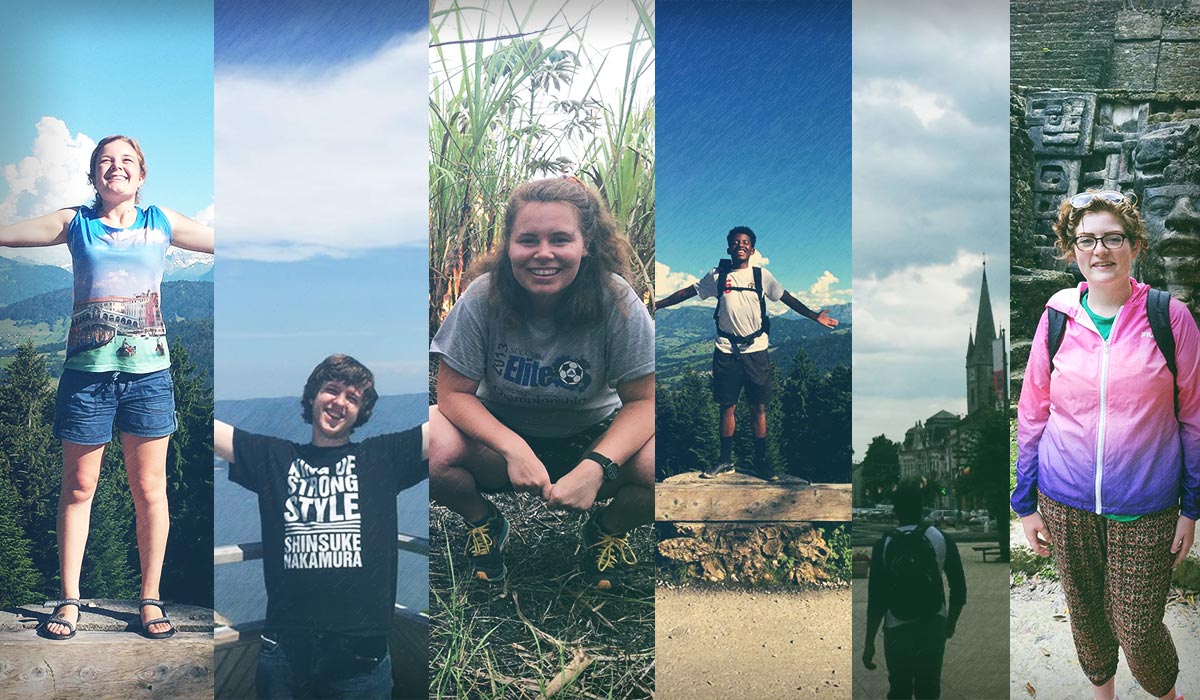Where in the world was NKU this summer?
August 21, 2016
Irakoze Dieudone already had trouble calling himself an American.
Originally from the Dominican Republic, the 20-year-old grew up in a Tanzanian Refugee camp, where he was taught to speak French.
The now junior at NKU, recalls his study abroad experience as a time when he truly questioned his identity.
“I had a server stop me and ask me where I was from,” Dieudone said. “No matter how many times I told him, ‘I am American,’ he wouldn’t believe me. I would get embarrassed the louder he would deny it.”
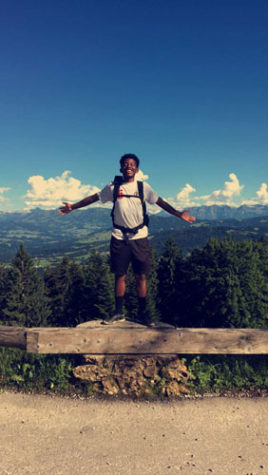
This wasn’t the only encounter he had with people approaching him differently because of the color of his skin. It seemed wherever he went during his trip, questions of who he is as a person followed him.
“It just made me consider how I looked to people or who they thought I was,” Dieudone said. “Do I even know who I am?”
Experiencing cultural and societal differences are a part of studying abroad — and more than ever, NKU students are willing to accept the challenges.
Dozens of students studied abroad this summer through NKU’s International Study Abroad Office. From Canada to Japan, students had their choice of 25 temporary places to call homes.
The office has expanded to serving over 300 students a year, and departments across campus — including psychology, informatics, electronic media broadcasting, theater and business — are integrating the study abroad experience into the course load.
Francis LeRoy, director of the International Studies Office, said students should not view studying abroad as unobtainable.
“Students shouldn’t consider studying abroad a luxury or as an afterthought,” LeRoy said. “I believe most students should be looking at this as a priority. The more that one gets to experience studying abroad the more they become more comfortable with the world.”
Michelle Melish, assistant director of Education Abroad, agreed that the experience is worth considering.
“There is a scholarship for everyone. There is always something that every student can be applicable for. Just by going out and looking at different ones you’ll find a million ways to make it affordable,” said Melish said.
LeRoy said studying abroad is the next step to enhance higher education. No longer is studying abroad an opportunity for a select few but an option that is continually growing. NKU continues to collaborate with universities around the world, making this experience one step closer to becoming the norm.
“I have always loved NKU,” LeRoy said. “We offer an outstanding side of services to students who deserve it. There are schools who have large numbers of student studying abroad, and we aren’t one of them, but we are a school where a lot of students may be the first in their families to go to college — let alone study abroad.
“Our NKU students never take this for granted and watching them excel with every moment is why I love doing this.”
Finish reading Dieudone’s story by clicking here, and check out where in the world NKU has gone with the map below.
View NKU Around The World in a full screen map
“There is more to life and this world we are all a part of.”

Dieudone studied in Bregenz, Austria for five weeks, where he enrolled in “International Real Estate and Leadership Around the World.”
He received a private scholarship, International Studies Scholarship and a KIIS grant. Beyond the financial assistance, hard work made his goal doable.
“My parents work 24/7 night and day,” Dieudone said. “You have to ask yourself if you really want to do it. For me this was a part of my dream and education. I want these experiences to make my education and skills stronger for my career. I told my parents this is something I have to do, and I did it.”
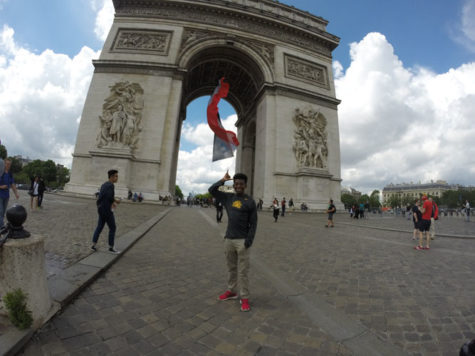
Dieudone visited Vienna and Milan, Italy, Munich, Germany, Paris, France and Switzerland over the course of his stay in Europe.
While visiting Austria, Dieudone and classmates were given the opportunity to meet businessmen, who gave the class a walk through of the real estate process.
For his other course, Dieudone spent most of the time in each city observing adolescent behaviors.
“Observing the children was fun for me,” Dieudone said. “I would go into coffee shops and without hesitation these kids would sit next to me and continue on with their conversations as if I wasn’t there. All of them were so polite while being so comfortable around strangers at the same time. Overall both classes were extremely rewarding.”
Although he encountered challenges with his nationality and race, Dieudone is grateful his experience abroad expanded his perspective.
“As a person this opened my world,” Dieudone said. “There is more to life and this world we are all a part of. Everything has a specific history and culture and it’s all so beautiful and breathtaking.
“Not only did I find myself and realize how people look at me and how I look at them is but how important it is to understand why we do the things we do. Coming to America gave me more possibilities than I could have ever imagined, that alone is enough of a reason for me to keep going.”
“Not even the stories add up to how real it was.”

How do you communicate with a family that doesn’t speak a word of English?
Junior Catherine Tuttle faced this challenge over the summer when living with her host family in Bregenz, Austria.
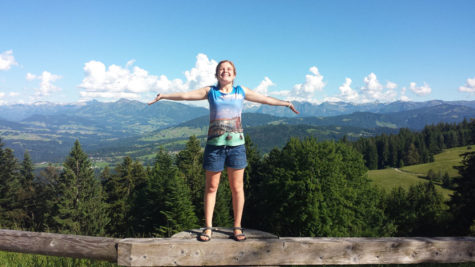
“I learned to communicate through my actions and expressions. It was definitely something new for me,” Tuttle said. “Making myself find a way through something was challenging but worth it. I never thought I would have to talk to someone through a dictionary. Being able to speak different languages and still put the effort to understand one another was humbling.”
In addition to learning to understand the language, Tuttle studied the psychology associated with the Holocaust and the culture.
Other than hitting the books, Tuttle and her classmates took time to observe people in Austria and Germany in hopes of learning psychological habits within the culture.
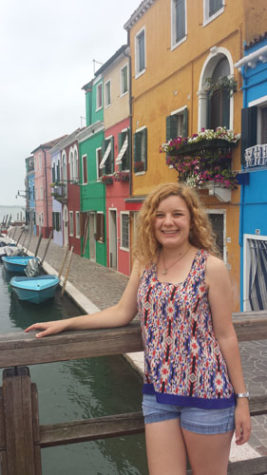
Outside of observing, she visited Dachau Concentration Camp to gain a better understanding of the emotional scars history left behind.
“You can read about anything you want, actually seeing it is a whole other thing,” Tuttle said. “The class as a whole grew together, making a connection through what we had seen and what we were feeling. Not even the stories add up to how real it was.”
Tuttle mentioned she is eager to go back.
“I have always been independent and I know I will never stay in one spot,” Tuttle said. “Going around the world is something I have always wanted to do and something I will continue to do. I grow as a person everywhere I go.”
She received the International Study Abroad Scholarship and the Honors Program Scholarship to help offset the cost of her trip. The trip cost came to $4,200. With that Tuttle had a host family, transportation access, admission to museums, meals and other lodging expenses included.
“Some experiences can’t be told.”

He studied chemistry over the summer and conducted experiments in a lab, but Adam Cox’s experience was far different than an ordinary summer class.
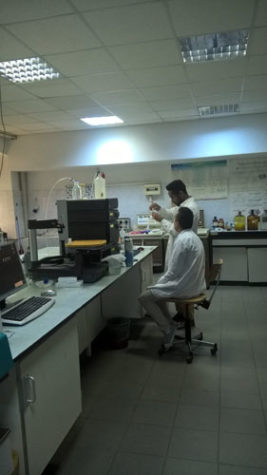
For 10 weeks, the senior studied introductory chemistry research and attended an international exchange seminar at the University of Babes-Bolyaifor in Romania with the help of Leon E. Booth, International Study Abroad and Institutional Study Abroad Departmental Scholarships.
“The process itself is not always going to be easy, but after all the work I put into it, it suddenly became possible,” Cox said. “I was able to go through the program and place that I originally wanted to go through. With determination everything began to fall into place. Anyone who really wants it can do it.”
On a daily basis Cox was mentored by students and professors during hands on experiments, assisting around the lab, learning to read graphs and spending time getting to know the culture.
Outside of school, Cox became familiar with his mentors and the world he was becoming a part of.
“I came here feeling like I stuck out,” Cox said. “I was the student that was starting from the bottom, everyone here was so experienced. Going into this was a bit daunting for me at first because I didn’t want to mess anything up. I think that this can be a common fear for everyone. After awhile these professors and mentors became my friends and I learned that I can be confident in something I love.”
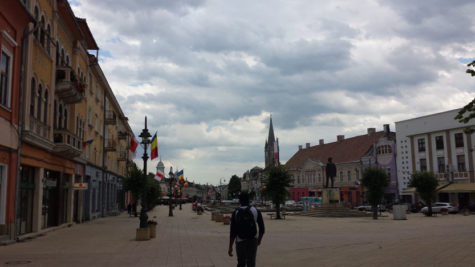
After his experience Cox realized he opened more doors and gained a better understanding of what he wants to do with his career after college.
“I feel like this opportunity gave me a chance to expand my skills and see what I really enjoy. NKU is one of the best universities at encouraging students and making them feel confident in undergraduate research,”Cox said.
Cox is adamant about getting others out there too.
“Some experiences can’t be told,” Cox said. “Sometimes you have to put yourself somewhere to be a part of things to actually understand something. Live life the way someone else does, step out of your comfort zone, and expand your thinking towards a certain subject. If you are even the slightest bit thinking of doing it, do it!”
“You learn to enjoy small things like amazing fruit or a simple smile.”

Despite a language barrier, NKU anthropology students spent time at a sugarcane mill in and within the communities of Belize conducting interviews for their personal research projects.
Emily Fox and Bronte Murrell, both senior anthropology majors, spent a month in Orange Walk Town, Belize studying in the Ethnographic Field School. They conducted anthropologic research with nine American students and one Belizean.
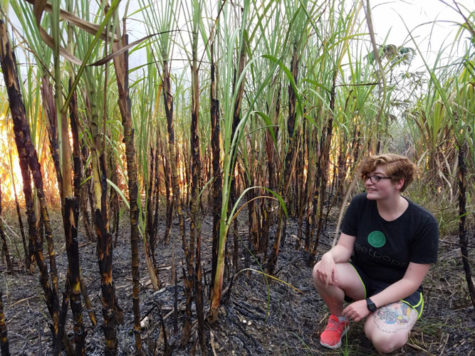
Fox said the experience helped her gain a newfound appreciation for meeting new people.
“My hands down favorite part was meeting everyone,” Fox said. “We would go from door to door to interview natives but one elderly man continues to stick out in my memory. He was so eager to invite me in and open up his life.
“He would take me around his house showing off things he had built and offering me gifts. You start to realize how much you enjoy the people rather than being in another country.”
Murrell said the trip gave her a deeper understanding and respect for the Belizean culture.
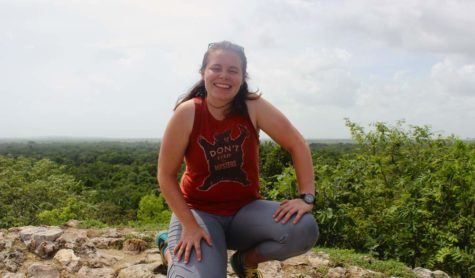
“As a person this has changed me in a million ways,” Murrell said. “My life is completely opposite from others, but seeing it made it more clear. Simple privileges like air conditioning became a challenge, especially when being in a culture that works outside all day long.”
Murrell said while she learned to appreciate the culture, the language barrier was a difficult challenge to overcome.
“Having to reach out to someone who speaks a language I don’t know was something I found tough to get around,” Murrell said. “I can’t say I ‘got around it’ you just learn to make things work. Going up to practice my interviewing skills became frustrating at times, but being willing to put yourself out there is important. Learning outside of yourself and everything you know changes perspectives”.
Both students received the International Study Abroad Scholarship and the CCSA Storyteller Scholarship, a scholarship proposing a project for each student to complete over their travels.
The trip came out to cost around $4,350 for each student, including lodging, meals, transportation, tuition fees and spending money.
Each student chose something that could be beneficial to them even when their travels were over. Fox created a photo blog showing the Belizean culture and her own growth as a student through photographs over the month of her stay.
For Murrell, creating a story blog was one highlight of her trip. Murrell was able to express challenges and goals while being abroad while showing her personal thoughts through storytelling.
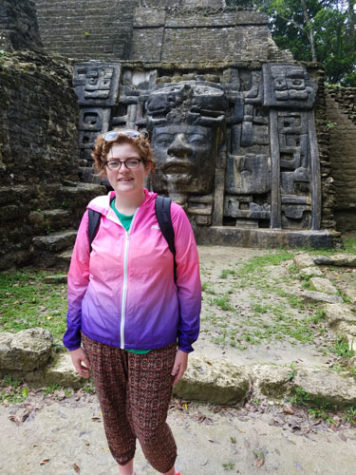
Fox said planning for the trip is not easy, but even the initial financial headache is all worth it.
“Not only did I study abroad for a month, but I now have experience with my ideal career and with something I love,” Fox said. “I think as a student this is essential for the steps to realizing what you were meant to do with your life.”
Murrell agreed that her study abroad experience helped her appreciate things in ways she never had before.
“You learn to enjoy small things like amazing fruit or a simple smile,” Murrell said. “Before I went to Belize I had a picture in my head that wasn’t even close to how it actually is. Belize has education and healthcare, I think the things people think about some places aren’t really all that true.”
“It’s worth everything you have.”

Connor Sullivan has a second family over 6,000 miles away.
While studyin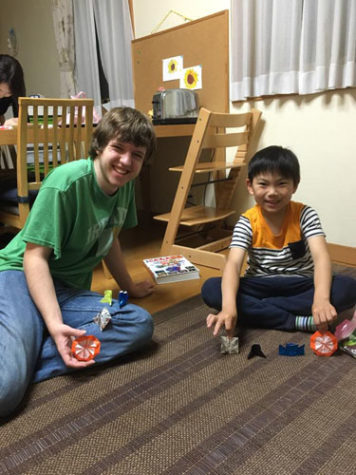 g abroad in Japan this summer, the senior computer information technology major lived with a host family in Nara.
g abroad in Japan this summer, the senior computer information technology major lived with a host family in Nara.
“I’ll admit, staying with a host family made me nervous at first,” Sullivan explained. “They’re more strict about certain things that I don’t normally think twice about, like taking my shoes off and eating dinner with the family at the same time every night.”
He said it was obvious that the family is a sacred part of Japanese culture.
“This ended up being my favorite part in the end because I made a second family in my eyes,” Sullivan said. “Just by being put in a situation and learn how to get through it on my own made me learn more than anything.”
He studied Japanese culture and women in Japanese literature during his time abroad. He also traveled to Nara, Tokyo, Hiroshima and Kyoto.
“I have always been interested in Japanese culture, whether it be food, music or media,” Sullivan said. “I was excited to take on this opportunity and see somewhere I have always wanted to learn about. I always said if I had the chance I wanted to do it, and this was my chance.”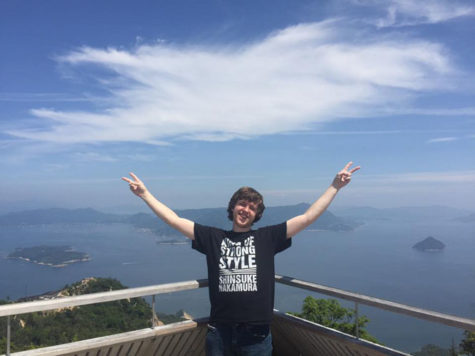
He received the International Study Abroad and Leon E. Booth Scholarships to help finance his studies in Japan. His trip cost about $6,000, including meals, plane tickets, transportation, attraction admission and lodging.
Along with a group of students, Sullivan observed everyday life in Japan, learning social norms and certain expectations.
“Everything is at the convenience of the people, everyone was going somewhere,” Sullivan said. “There were no cars, and if you owned a car you were someone with a lot of money. Transportation was a big difference for me. Going place to place I would get looks from people. I was really just more concerned about embarrassing myself. I didn’t want anyone to think I was being disrespectful.”
Outside of the class Sullivan visited parks, shrines, arcades, karaoke and a LMC concert. Sullivan noted that shrines in Japan were used for both tourism and religious worship.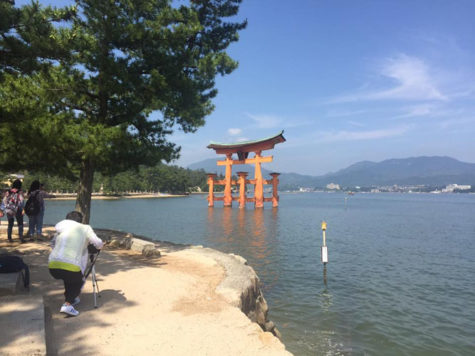
“Shrines were something that threw me off,” Sullivan said. “Here in the U.S. if we used a church as an attraction people would easily get offended. But for the Japanese culture it isn’t as offensive or closed off. Everyone had a different practice for different needs in their life and I liked that.”
In the end Sullivan fell more in love with Japan. He wants to go back to study more places and broaden his perspective.
“It’s worth everything you have,” Sullivan said. “Learning outside of what you know allows you to grow better as a student.”

